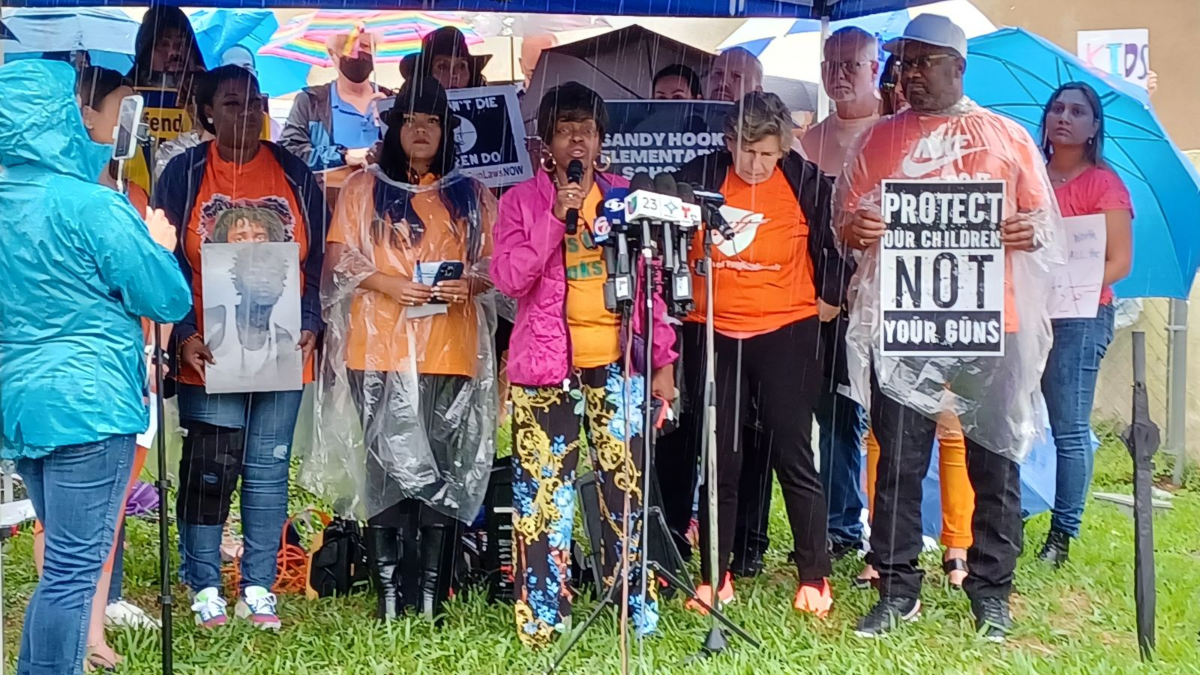
Photo by Joshua Ceballos

Audio By Carbonatix
Though South Florida is under a tropical storm warning this weekend, teachers, activists, and mothers of gun-violence victims braved strong winds and heavy rains Friday morning outside U.S. Sen. Marco Rubio’s Miami office in Glenvar Heights to demand that legislators commit to enacting gun laws in the wake of recent mass shootings across the nation.
“We’re here rain or shine, no matter what. This is what we do,” Romania Dukes, founder and president of Mothers Fighting for Justice, whose son De’Michael was killed by a stray bullet in 2014, told New Times. “We’re all united: Parkland moms, Pulse moms. We’re together, and we don’t want to take away guns. We want commonsense laws.”
Florida Agriculture Commissioner Nikki Fried and Parkland shooting survivor and March for Our Lives cofounder David Hogg stood alongside Dukes and more than 20 protesters, including members of the United Teachers of Dade and the American Federation of Teachers unions. Following recent mass shootings in Buffalo, Tulsa, and Uvalde, Texas, the parents and organizations joined forces to rail against Rubio and other politicians for failing to enact real change in the face of a staggering number of mass shootings in the U.S.: more than 200 since the start of this year.
“Teachers are exhausted from mourning. We’re tired of going to students’ funerals. This is a moment of grief for all of us, and children’s lives are more valuable than guns,” said Karla Hernandez Mats, president of the United Teachers of Dade.

Local activist Tangela Sears (center) was among those who called on Marco Rubio to help enact federal gun-law reform amid the current spate of mass shootings.
Photo by Joshua Ceballos
Mats, Hogg, and others stressed that they’re “not trying to take away guns” from rightful gun owners. Their goal is to pass federal laws that would make obtaining assault weapons more difficult (or in some cases, impossible). The activists called for raising the minimum age required to purchase a gun in other states from 18 to 21, arguing that the Uvalde shooter should not have been able to purchase two rifles just after his 18th birthday on May 17, and then murder 21 people seven days later.
The minimum age to buy a gun in Florida is 21. It was raised from 18 after the shooting at Marjory Stoneman Douglas High School on February 14, 2018.
The groups also called for greater emphasis on background checks for gun buyers and the banning of AR-15 and similar so-called assault weapons like the ones used in Uvalde, Tulsa, and Parkland, which American Federation of Teachers President Randi Weingarten referred to as “weapons of war.”
Rubio did not meet with the protesters; it’s unclear whether he was at his office. In response to New Times‘ request for comment about the event and his stance on gun reform, Rubio’s press office sent a link to Rubio’s tweet from Thursday listing his two legislative proposals on gun violence – “threat assessments to identify dangerous people” and “allowing police to intervene before threats lead to murder” – and added no further comment.
Many are finally realizing the 2 bills I have been working for 4 years are the best way to prevent mass shootings
1. Threat Assessments to identify dangerous peoplehttps://t.co/i2Nw4VrGpU
2. Allowing police to intervene before threats lead to murder:https://t.co/rJRWHqh8xh
— Marco Rubio (@marcorubio) June 2, 2022
The Florida senator has come under fire recently for receiving $3.3 million in donations from the National Rifle Association and pushing back against proposals to ban assault weapons. Rubio has supported the “good guy with a gun theory” – the notion that armed individuals can stop mass shooters – and recently criticized the National Basketball Association in a series of tweets for “politicizing” the Uvalde shooting after the Miami Heat broadcast gun control-themed messages during last week’s playoff game against the Boston Celtics at FTX Arena.
In March of 2018, after the Parkland shooting, Rubio and other legislators from both sides of the aisle introduced the Extreme Risk Protection Order and Violence Prevention Act, a federal law that would use Department of Justice funds to incentivize state legislators to enact “red flag” laws that allow law enforcement officials to confiscate guns from a person if a judge deems them a danger to themselves or others. The bill failed. Rubio and his fellow lawmakers reintroduced it in 2021, but there has been no action on it since then.
While many at today’s protest criticized Rubio for his inaction and called for Floridians to vote him out of office in November, Hogg stressed the need to reach across party lines to enact commonsense gun laws. Hogg asked to meet with Rubio to discuss making these changes.
“We understand that we don’t agree on everything, but let’s find what we can agree on. That’s what we did after Parkland in Florida,” Hogg told New Times. “If we can stop one more Parkland, it’s worth it – or one more student, who doesn’t get on the news, that dies outside of school because he lives in a Black and brown community.”